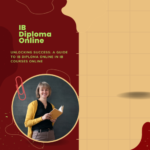Excelling in Your IB Physics Exam: 5 Proven Tips for Success
The International Baccalaureate (IB) Physics exam is known for its depth and complexity, challenging students to apply theoretical knowledge to real-world scenarios. Achieving success in this exam requires not only a solid understanding of physics concepts but also effective study strategies and exam techniques. In this article, we’ll explore five proven tips to help you improve your IB Physics exam grade and approach the test with confidence.
1. Master the Fundamentals:
The foundation of success in IB Physics lies in a thorough understanding of the fundamentals. Before delving into complex topics, ensure you have a strong grasp of basic principles, equations, and units. Review your class notes, textbooks, and online resources to reinforce your understanding of key concepts in mechanics, thermodynamics, electromagnetism, and more. A solid foundation will make it easier to tackle advanced topics and problem-solving during the exam.
2. Practice Regularly:
Physics is a subject that becomes clearer with practice. Dedicate regular study sessions to solving physics problems, both from your textbook and past IB Physics exam papers. Practice not only enhances your problem-solving skills but also familiarizes you with the exam format and question types. Utilize resources such as online physics problem-solving platforms, official IB resources, and additional textbooks to broaden your exposure to various problem-solving scenarios.
3. Understand the Assessment Criteria:
Familiarize yourself with the assessment criteria used in the
. Understand how your responses are evaluated, including the importance of clarity, coherence, and the application of physics principles. Pay attention to command terms used in questions, such as “explain,” “compare,” and “evaluate,” as they provide guidance on the depth of your response. By aligning your answers with the assessment criteria, you can maximize your chances of scoring well.
4. Create a Comprehensive Study Plan:
Effective time management is crucial in preparing for the IB Physics Syllabus. Develop a detailed study plan that covers all topics in the syllabus. Allocate specific time slots for each unit, ensuring you dedicate more time to challenging topics or those with greater weightage in the exam. Be realistic in your planning, considering your school commitments, extracurricular activities, and the need for breaks to maintain focus. A well-structured study plan ensures you cover all essential content and have ample time for revision.
5. Utilize Practical Labs and Experiments:
IB Physics places a significant emphasis on practical skills and the application of theoretical knowledge. Engage actively in laboratory sessions, as these experiences provide valuable insights into real-world physics phenomena. Understand the purpose of each experiment, the variables involved, and the expected outcomes. Document your observations and findings accurately, as these may be useful in both internal assessments and the exam itself. Hands-on experience not only reinforces theoretical concepts but also enhances your ability to explain and apply physics principles.
Bonus Tips:
- Stay Informed about Current Developments: Physics is a dynamic field, with new discoveries and advancements occurring regularly. Stay updated with current developments in physics through reputable scientific journals, documentaries, or online platforms. Incorporating real-world examples and applications into your responses can showcase a broader understanding of the subject.
- Collaborate with Peers: Form study groups or engage in collaborative learning with your classmates. Discussing physics concepts, problem-solving approaches, and different perspectives can enhance your understanding and expose you to alternative methods of thinking. Explaining concepts to others reinforces your own knowledge and can highlight areas that need further clarification.
- Seek Guidance from Teachers: If you encounter challenging topics or have specific questions, don’t hesitate to seek guidance from your physics teacher. They can provide additional explanations, clarify doubts, and offer insights into effective study strategies. Your teacher’s expertise is a valuable resource in your journey toward success in the IB Physics exam.
In conclusion, excelling in the IB Physics Tutor requires a combination of knowledge, skills, and effective study strategies. By mastering the fundamentals, practicing regularly, understanding the assessment criteria, creating a comprehensive study plan, and engaging in practical labs, you can significantly improve your exam grade. Additionally, staying informed about current developments, collaborating with peers, and seeking guidance from teachers can further enhance your preparation. Remember that success in IB Physics is not solely about memorization but about applying your understanding to solve complex problems and articulate your insights effectively. Approach the exam with confidence, and you’ll be well-positioned to achieve success in IB Physics. Good luck!



